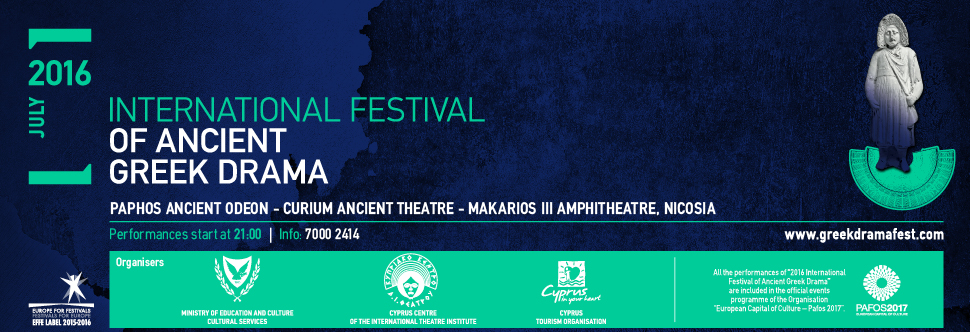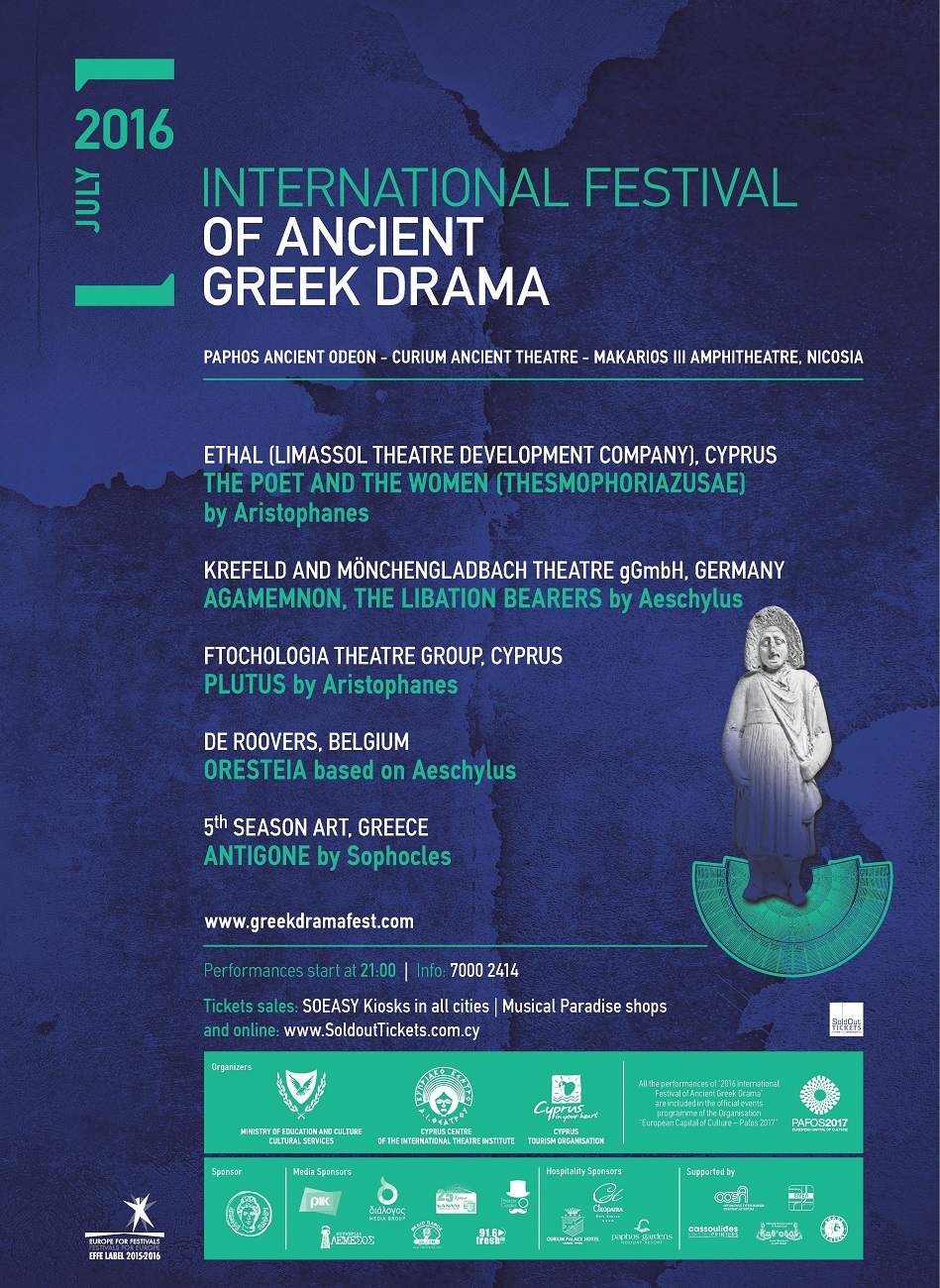
2016 INTERNATIONAL FESTIVAL OF ANCIENT GREEK DRAMA
Where: NICOSIA, LIMASSOL & PAPHOS
When: 03/07/2016 - 30/07/2016
Tickets: €10 & €5 (Students, Senior Citizens, National Guard, unemployed)
About the event:
3-30 JULY 2016
THESMOPHORIAZUSAE|AGAMEMNON, THE LIBATION BEARERS|PLUTUS|ORESTEIA|ANTIGONE
Free admission to persons with disabilities. Please show proof at ticket gate
All performances star at 21:00 | Please arrive at the theatre before 20:45
More about the event:
ETHAL (LIMASSOL THEATRE DEVELOPMENT COMPANY), CYPRUS
THE POET AND THE WOMEN (THESMOPHORIAZUSAE) by Aristophanes
▪ Sunday 3 July│Paphos Ancient Odeon [official opening]
▪ Saturday 9 July│Curium Ancient Theatre
▪ Monday 11 July│Makarios III Amphitheatre, Nicosia
ETHAL opens this year’s International Festival of Ancient Greek Drama with Aristophanes’ multifaceted comedy, The Poet and the Women. The women wish to get rid of Euripides, who in their opinion is a misogynist, feeling insulted by the way he abuses them in his tragedies. They take advantage of the Festival of Demeter, Thesmophoria and decide to set in motion a plan to destroy him. As his only way out, Euripides sends his friend Mnesilochus, dressed as a woman, to go to the celebration that is strictly forbidden for men, in order to defend him. Mnesilochus accepts this difficult task. However, in his over eager attempt to justify Euripides, he betrays his sex and things get complicated.
In The Poet and the Women, which is one of the three “female” comedies of Aristophanes that have survived, human weakness is outlined with a charming sense of humour and scathing irony.
▪ With English and Russian surtitles
Translated by Costis Colotas
Directed by Minas Tigkilis
Set/Costume design: Lakis Genethlis
Lighting Design: Panayiotis Manousis
Music: Dimitris Zachariou
Choreography: Lambros Lambrou
Assistant to the Director: Theodora Vicha
Assistant to the Choreographer: Elena Gavriel
Cast:
Costas Vichas (Mnesilochus), Panayiotis Larkou (Euripides), Filippos Sofianos (Agathon), Eftychios Poullaides (Cleisthenes), Marinos Calotychos (Servant of Agathon, a Scythian Policeman), Melanie Steliou (Herald), Paola Hadjilambri (Women A,B,C), Ivie Nicolaidou (Women A,B,C), Themis Ppolou (Women A,B,C), Mikaella Theodoulidou (Deer A), Elena Hileti (Deer B), Varvara Christofi (Deer C), Elena Gavriel, Stefanie Mavrokordatou
_______________________________________________________________________________________
KREFELD AND MÖNCHENGLADBACH THEATRE gGmbH, GERMANY
AGAMEMNON, THE LIBATION BEARERS by Aeschylus
▪ Tuesday 5 July│Curium Ancient Theatre
▪ Thursday 7 July│Makarios III Amphitheatre, Nicosia
The Krefeld and Mönchengladbach Theatre gGmbH, the biggest theatre in the Lower Rhine region in the west of Germany, presents the two tragedies of Aeschylus’ trilogy Oresteia, Agamemnon and The Libation Bearers (The Choephori), translated by Peter Stein and directed by Matthias Gehrt.
Agamemnon, the victor of the ten year war of Troy, returns to Argos. There his wife Clytemnestra, mother of Orestes and lover of Aegisthus welcomes him as a victor and murders him shortly after he has entered the palace, without any qualms, as a revenge for the sacrifice of their daughter Iphigenia. At the same time she assists Aegisthus to become King of Argos. In the second part of the trilogy, The Libation Bearers, the exiled Orestes returns home to take revenge for his father’s murder.
Aeschylus decodes profound realities of the human soul and thought.
▪With Greek and English surtitles
Translated by Peter Stein
Directed by Matthias Gehrt
Stage Designer: Gabriele Trinczek
Costume Designer: Sibylle Gädecke
Music: Jörg Ostermayer
Choreographer: Robert North
Dramaturge, Production Manager: Martin Vöhringer
Stage Manager: Petra Hackbarth
Assistant to the Director: Sascha Mey
Cast:
Eva Spott (Clytemnestra), Joachim Henschke (Agamemnon, Choir of elders of Argos), Helen Wendt (Cassandra, Choir of slave women), Bruno Winzen (Aegisthus, Choir of elders of Argos), Cornelius Gebert (Orestes, Choir of elders of Argos), Esther Keil (Electra, Servant), Ronny Tomiska (Pylades, Choir of elders of Argos), Jonathan Hutter (Choir of elders of Argos), Adrian Linke (Choir of elders of Argos), Paul Steinbach (Choir of elders of Argos), Christopher Wintgens (Messenger, Choir of elders of Argos), Lena Eikenbusch (Servant, Choir of slave women, Nurse), Paula Emmrich (Choir of slave women)
_______________________________________________________________________________________
FTOCHOLOGIA THEATRE GROUP, CYPRUS
PLUTUS by Aristophanes
▪ Tuesday 19 July│Makarios III Amphitheatre, Nicosia
▪ Friday 22 July│Paphos Ancient Odeon
▪ Saturday 23 July│Curium Ancient Theatre
A new theatre group “Ftochologia” presents the last comedy of Aristophanes that survived to us, a scathing critique on the human dream for wealth. Chremylus, swamped in debt, goes to Delphi to ask the oracle whether he should bring up his son as an honest man or as a rascal. On his way back he meets Plutus, who was blinded by Zeus so he would be unable to distinguish between the just and the unjust and would randomly distribute wealth. With the help of Chremylus and his slave Carion, Plutus’ sight is restored at the temple of Asklepios and he decides to bring back justice to society. While everybody is trying to benefit from this new situation, Poverty appears, in an effort to persuade them that wealth never brings happiness.
In Plutus (Wealth), Aristophanes comments on the diachronically timely social injustices and ridicules the unfair distribution of wealth, but also corruption.
▪ With English surtitles
Adaptation/Dramaturgy/Direction: Kostas Silvestros
Set/Costume Design: Marina Hadjilouca
Musicians on stage: Gav the band
Choreography: Eva Kalomiri
Lighting Design: Vasilis Petinaris
Assistant to the Director: Elena Georgiadou
Assistant to the Set Designer: Sosanna Tomazou
Photographs: Michael Georgiades
Cast:
Demetris Antoniou (Chremylus), Yiannis Minos (Carion), Marina Vrondi (Poverty), Valentinos Kokkinos (Plutus), Vasilis Charalambous (Blepsidemus, Informer, Old Woman, Hermes), Herodotos Miltiadous (Wife to Chremylus, Just Man, Young Man, Priest), Georgina Tatsi (Chorus)
_______________________________________________________________________________________
DE ROOVERS, BELGIUM
ORESTEIA, based on Aeschylus
▪ Monday 25 July│Paphos Ancient Odeon
▪ Wednesday 27 July│Makarios III Amphitheatre, Nicosia
The Belgian theatre company de Roovers participates for the first time in the Festival, presenting the production Oresteia, based on Aeschylus. The trilogy Oresteia, the last and greatest work by Aeschylus, has been characterized as “the greatest achievement of human thought”. Three murders, three culprits; their demons, their fate and their moral dilemmas constitute the vicious circle of revenge that is interrupted by the new order of things. The principle of “an eye for an eye, a tooth for a tooth” is replaced by a different form of justice, the court. The de Roovers group based their performance on the trilogy by Aeschylus, translated into English by the outstanding poet Ted Hughes and into Dutch by Berard Dewulf. The original text is preserved, punctuated with excerpts from contemporary writers.
▪ With Greek and English surtitles
Translated into English by Ted Hughes
Translated into Dutch by Bernard Dewulf
Adaptation/Direction: de Roovers
Music composition/ Musical direction: Peter Spaepen
Scenography/Photography: Stef Stessel
Costumes: Pynoo
Lights: Bert Vermeulen, Stef Stessel
Soundscape: Eric Engels
Video technology: Guy Vandebril
Light, sound and video engineers: Frank Haesevoets, Ben Bonner, Wim Bernaers
Cast:
Robby Cleiren (Agamemnon, Apollo), Sara De Bosschere (Cassandra, Electra, Athene), Luc Nuyens (Herald, Aegisthus, Furies), Sofie Sente (Chorus), Ilse Uitterlinden (Clytemnestra, Furies), Jeroen Vander Ven (Watchman, Orestes) Singing/choir: Kurt Beheydt, Peter Pype, Eva Tulkens, Iris Berardocco, Fré Madou, Sara Raes, Valerie Mertens, Floris Lammens, Astrid Annicaert
_______________________________________________________________________________________
5TH SEASON ART, GREECE
ANTIGONE by Sophocles
▪ Friday 29 July│Curium Ancient Theatre
▪ Saturday 30 July│Curium Ancient Theatre
5th Season Art presents Sophocles’ Antigone, a diachronic criticism on the arrogance of power, directed by Themis Moumoulidis, using a new translation by Panayiota Pandazi. It is a contemporary approach to the masterly tragedy presented in a poetic visual environment, complemented with contemporary music by Stavros Gasparatos.
In Antigone, a deeply political text, the need of the free man to live in accordance with his personal value system, clashes with the attempted dominance of an arbitrary and arrogant power. However, is it possible for one to represent the whole of society, and therefore claim universal legitimacy and acceptance of his authority? Antigone decides to bury her brother, convinced that the unwritten law of the heart is above human law.
▪ With English surtitles
Translated by Panayiota Pandazi
Directed by Themis Moumoulidis
Set/Costume Design: Panayiota Kokkorou
Music: Stavros Gasparatos
Movement: Elena Gerodimou
Sound director: Yiannis Lambropoulos
Cast:
Ioanna Pappa (Antigone), Nikitas Tsakiroglou (Creon), Eleni Zarafidou (Ismene, Theban Citizen), Stavros Zalmas (Guard, First Messenger), Giorgos Papapavlou (Haemon, Theban Citizen), Nikos Arvanitis (Teiresias), Marouska Panayiotopoulou (Eurydice, Theban Citizen),Kostas Falelakis (Second Messenger, Theban Citizen), Costas Velentzas, Manos Karatzoyiannis, Giorgos Nousis (Theban Citizens)
--------------------------------------------------------------------------------------------------------------------------------------
Notes:
1. To facilitate the public in Nicosia, free shuttle transport from Nicosia to Curium will be offered, for the two performances of Antigone at the Curium Ancient Theatre, in 29th and 30th of July.
Departure: 18:30 (parking opposite the Handicraft Centre in Athalassa Avenue)
Reservations are obligatory on 7000 2414, until the 25rd of July, 2016
2. Spectators attending performances at Curium Ancient Theatre are advised to arrive at least 45 minutes before the performance. Cars must be parked at St. Hermogenes and spectators will be transported to the theatre by buses. The last bus route from St. Hermogenes to the theatre departs at 20:45.












